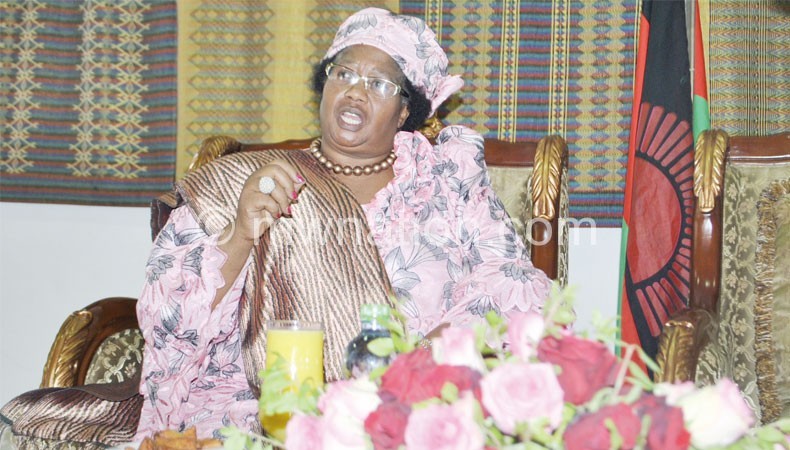EIU says Malawi govt bruised by cashgate

The Economist Intelligence Unit (EIU), an influential Britain-based economic think-tank, says the President Joyce Banda administration has been severely bruised and weakened by a large corruption scandal dubbed Cashgate that has seen billions on taxpayers’ money looted.
EIU has said this in a forecast for Malawi ahead of the May 20 Tripartite Elections which it has predicted will be tightly fought.
“Yet, helped by a crackdown on graft, a split opposition, and the benefits of incumbency, we expect Mrs. Banda and her People’s Party to secure another mandate,” said the EIU in a country brief for January 2014.
A recent forensic audit report done by a British firm, Baker Tilly, has revealed that about K13 billion (about $32.5m) has been lost in the worst financial scandal to hit Capital Hill in recent times.
The cashgate compelled the country’s donors under the Common Approach to Budget Support (Cabs) withholding about $150 million in November 2013. The grouping is expected to meet this month to decide on the country’s fate.
The International Monetary Fund (IMF) which withheld its $20 million last year under the three-year Extended Credit Facility (ECF), disbursed the funds in January after a successful third and fourth reviews under the programme.
But the EIU has said a drop in aid inflows will be partly offset by robust agricultural growth and expect real gross domestic product (GDP) growth to pick up to an average of 4.5 percent between 2014 and 2015.
Malawi’s agriculture sector is expected to rebound this year largely due to good rains and the Farm Input Subsidy Programme (Fisp) with preliminary estimates showing that tobacco output will surpass that of last year.
The country is also expected to produce a surplus staple crop, maize.
The sentiments by EIU that the government has been weakened by the cashgate is also in line with what the US government’s Overseas Private Investment Corporation (Opic) president and chief executive officer, Elizabeth Littlefield, said that the the looting of funds at Capital Hills will make it difficult for Malawi to attract foreign investors in the short term.
Malawi is risking being perceived by the international community as a country without proper systems, a development that could deter the inflow of foreign direct investment (FDI).
FDI inflow is critical to creating both direct and indirect jobs and, in turn, contributes substantially to Malawi’s gross domestic product (GDP)—-a market value of all financial goods and services produced in a year—currently estimated at K1.8 trillion.






Hilida wadya wani!
Our country is rich with citizens in diaspora who are experienced and could easily help our country move forward. How could you possibly convince these guys to come back and live in the middle of mediocrity? Is it that difficult to instill ethical behavior in the work place especially government departments? Authorities are not willing to make examples of wrong doers and that is a fact. They are busy covering up for each other instead of doing the right thing. Pass a law that deals with corruption harshly and don’t the let the law collect dust but implement it and let everybody see it is working.It seems everybody wakes up to stealing in Malawi. What a pity.
The problem is that this campaign time, we should hope and pray that the incoming Government will have Love of the Country at heart!! But sincerely speaking I see that those who are blaming the President are callous blood suckers because we all know that her Government was a caretaker one, Did we expect President and PP to suck all those wrong doers she found in Offices fired? especially Senior Civil servants!!! Cashgate has come a long way except that it was the Diamond that made people to campaign for Power in Malawi!!! Manifestoes were immediately side stepped once a mandate to rule was granted!! Cashgate has been with us for a long time no wonder Political Dog fights never ceased and deaths have been the order of the day orchestrated by those in state house, since the time of Kamuzu and Tembo!!! It is only this current Government that has found it necessary to inform the Nation about Looting and bankruptcy of Central Government account No 1!!!! So you can not expect Dr JB Government to be completely blameless yet it never sucked Thugs left in Government by UDF, DPP and even KAMUZU AND TEMBO, instead it formed a Government of National Unity!! Which I believe to have a good security foresight!!! Malawi could have been torn apart if it were not for Government and Dr JB to pause with cool Heads!! To GOVERN IS DIFFERNT FROM BEING GOVERNED AND YOU DO NOT HAVE TO EXPECT PEOPLE TO EAT POLITICAL SLOGANS!!! IN SHORT DO NOT ASCEND TO POWER TO TELL PEOPLE ABOUT HOW HONNEST YOU ARE AS A CHRISTIAN YET HAVE NO CLUE ABOUT HOW TO FEED AND DEVELOP THE COUNTRY ( MOTHER MALAWI!!!!!!).
With these words I pray that you exercise your VOTE WISELY and MAY GOD BLESS THE REPUBLIC OF MALAWI)!!!!